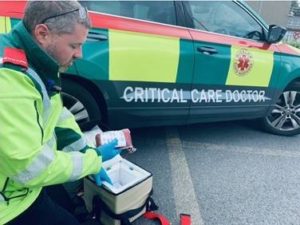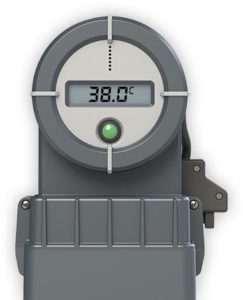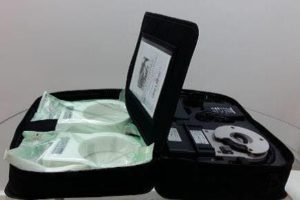Pre Hospital Blood and Fluid Warmer equipment purchase:
08/08/2019
St. Vincent’s Foundation recently approved a grant for a system to enable blood transfusions be delivered at trauma scenes. Up to this, the patient could only receive blood when they arrived at the hospital. This initiative will save lives and we are delighted that the investment has been enabled by donors. The article below by the lead Consultant of the project, Dr David Menzies, explains how patients will benefit:
Blood transfusions can now be delivered at trauma scenes – for the first time in Ireland
– Major haemorrhage is one of the top causes of death from major trauma
– New blood transfusion service expected to reduce mortality rates
Patients in the Dublin/Wicklow region suffering from life threatening bleeding following major trauma no longer have to wait until their arrival at the Emergency Department (ED) before receiving a blood transfusion.
The blood transfusion laboratory at St. Vincent’s University Hospital (SVUH), in partnership with Wicklow Rapid Response (WWRR), a declared asset to the National Ambulance Service (NAS), is now able to provide emergency blood and plasma directly at the scene of a trauma.
This is the first time in Ireland that blood will be available for pre-hospital transfusion and will provide a significant improvement in the care that can be delivered to patients immediately after a major trauma.
Wicklow Rapid Response is a pre-hospital critical care service driven voluntarily by Dr. David Menzies, Emergency Medicine Consultant from St. Vincent’s University Hospital in partnership with the National Ambulance Service. It is one of a handful of services in Ireland where doctors are tasked by the NAS to serious medical and trauma emergencies where the patient may benefit from critical care treatment at the roadside.
To date the only method for pre-hospital medics to resuscitate bleeding patients has been to use saline solution but, because it doesn’t carry oxygen or clot, it is not the ideal treatment.
Now, in the event of life-threatening bleeding, the WWRR critical care doctor will be able to deliver life-saving blood transfusions to patients without having to wait until their arrival at the Emergency Department.
Dr. David Menzies, St. Vincent’s University Hospital said: “There are a group of patients who are so severely injured that we will have blood waiting for them on arrival in the Emergency Department for immediate transfusion. Pre hospital blood transfusion will reduce significantly the time it takes to deliver this treatment. Our current case load indicates that a small but important number of patients may benefit from this every year. The facility to administer life-saving transfusions in the pre hospital setting is already the standard of care for pre hospital critical care services in the UK, Northern Europe, Australasia and the USA. It’s fantastic that we can now offer it here in Ireland for the first time.”
Mr Martin Dunne, Director of the National Ambulance Service said: “The patient is at the heart of our work and the NAS values greatly the contribution of the voluntary pre hospital critical care services make to patient care. The NAS is delighted to support the enhanced patient care that pre hospital transfusion can offer and looks forward to expanding this project”.
Dr Joan Fitzgerald, Consultant Haematologist at St. Vincent’s University Hospital said: “This exciting new development has been several months in preparation and will make a real difference to the treatment we can deliver to seriously injured patients in the region. The Medical Scientists in the Blood Transfusion Laboratory have worked closely with the Emergency Department, the National Ambulance Service and Wicklow Rapid Response to ensure the system is safe and secure with no wastage of blood products and full traceability 24/7 including holiday periods”.
In addition to red cells, WWRR will be carrying two units of plasma to promote blood clotting. While the red cells carry oxygen, transfusing plasma in a 1:1 ratio with red cells is the current best evidence for promoting blood clotting, a recognised problem in major trauma patients. The emergency blood and plasma are supplied every 48 hours from the blood transfusion laboratory at SVUH and replenished as required. If unused, the products are returned within 48 hours to the blood transfusion laboratory at SVUH for use elsewhere, preventing any wastage. Blood products are a precious resource and must be stored refrigerated. The blood products are stored in Credo © “Golden Hour” boxes, which are validated for prolonged storage on the WWRR RRV at 4oC thereby making the blood and plasma immediately available at the location of a major trauma.
When the blood is required, it must be warmed to body temperature which is a key step in preventing hypothermia and other complications in patients receiving blood products.
Thanks to fundraising and donations, St Vincent’s Foundation were recently able to purchase a portable blood and fluid warmer for pre hospital use. The Qinflow © Warrior blood and fluid warmer is a state of the art device, specifically designed for out of hospital use. This will be the first such unit in use in Ireland and it has the capability to warm intravenous fluids and blood products from 4oC to body temperature in seconds. We are really grateful to the donors and fundraisers who have made this possible
Dr. Stephen Field, Medical & Scientific Director of the Irish Blood Transfusion Service said: “The IBTS are delighted to support this initiative, which will be life-saving. There is good scientific evidence for pre hospital transfusion and it is the norm elsewhere. Blood products are always in demand, if people would like to support this, one of the best ways they can do so is to donate blood themselves”.
Pictures below show Dr. David Menzies, Emergency Medicine Consultant, St. Vincent’s University Hospital and the portable blood and fluid warmer equipment.
Return to News & Events


